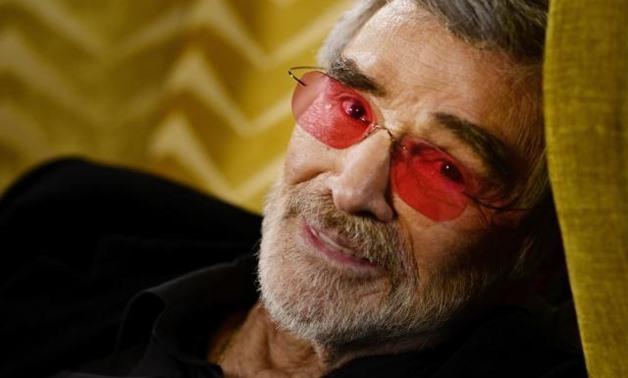
Hollywood actor Burt Reynolds poses for a portrait during an interview with Reuters at a hotel in central London, Britain December 3, 2015. REUTERS/Dylan Martinez.
(Reuters) - Burt Reynolds, whose good looks and charm made him one of Hollywood’s most popular actors as he starred in such films as “Deliverance,” “The Longest Yard” and “Smokey and the Bandit” in the 1970s and ‘80s, died on Thursday at age 82.
Reynolds, who was set to appear next summer in the all-star cast of director Quentin Tarantino’s next film, died in the morning at a hospital near his South Florida home, according to his manager, Erik Kritzer.
A caretaker for Reynolds at his estate in Hobe Sound, north of Palm Beach, was heard telling an emergency dispatcher that the actor was having chest pains and breathing difficulties in an audiotape of the call released by the Martin County Sheriff’s Department.
The actor was later pronounced dead at the Jupiter Medical Center.
“It is with a broken heart that I said goodbye to my uncle today,” Reynolds’ niece Nancy Lee Hess said in a statement issued through Kritzer.
While acknowledging that Reynolds had a history of health issues - he underwent quintuple heart bypass surgery in 2010 - Hess called her uncle’s death “totally unexpected.”
“My uncle was not just a movie icon; he was a generous, passionate and sensitive man, who was dedicated to his family, friends, fans and acting students,” Hess said.
At the peak of his career, Reynolds was one of the most bankable actors in the film industry, reeling off a series of box-office smashes until a career downturn in the mid-1980s.
He rebounded in 1997 with an Oscar nomination for his supporting role as a porn director in Paul Thomas Anderson’s “Boogie Nights” - a role Reynolds despised - and won an Emmy for his role in the 1990-1994 television series “Evening Shade.”
With his trademark mustache, rugged looks and macho aura, Reynolds was a leading male sex symbol of the 1970s. He famously appeared naked - reclining on a bearskin rug with his arm strategically positioned for the sake of modesty - in a centerfold in the women’s magazine Cosmopolitan in 1972.
Reynolds’ personal life sometimes overshadowed his movies, including marriages that ended in divorce to actresses Loni Anderson and Judy Carne and romances with Sally Field and Dinah Shore, among others. His financial woes and his struggles with prescription pain medication also generated attention.
Reynolds cited director John Boorman’s Oscar-nominated 1972 “Deliverance” as his best film and said he regretted that the hoopla from his Cosmopolitan appearance detracted from the movie that made him a star. He played tough guy Lewis Medlock - opposite Jon Voight, Ned Beatty and Ronny Cox - in the chilling tale of a canoe trip gone bad in rural Georgia.
His credits encompassed lead roles in dozens of films, including “White Lightning” (1973), “W.W. and the Dixie Dancekings” (1975), “Hustle” (1975), “Nickelodeon” (1976) and “Semi-Tough” (1977). He was the top money-making star at the box office in an annual poll of movie exhibitors from 1978 through 1982.
Many of Reynolds’ films were set in the South. He often played a lovable rascal who outwits local authorities, as in director Hal Needham’s 1977 crowd-pleasing action comedy “Smokey and the Bandit,” co-starring his then-girlfriend Sally Field and Jackie Gleason, and its two sequels.
Another of his memorable performances was that of a former pro quarterback who lands in prison and assembles a team of convicts to play the warden’s squad of brutal prison guards in 1974’s rollicking “The Longest Yard,” directed by Robert Aldrich. He appeared in a supporting role in 2005’s remake with Adam Sandler.
Reynolds also directed several movies in which he starred, including “Gator” (1976), “The End” (1978), “Sharky’s Machine” (1981) and “Stick” (1985).


Comments
Leave a Comment